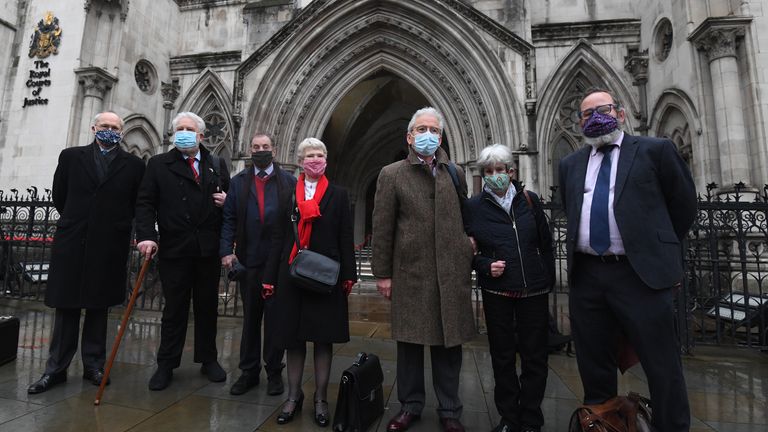A group of trade unionists who were convicted for picketing nearly 50 years ago have won a bid to clear their names.
The "Shrewsbury 24" picketed during the 1972 national builders' strike and were charged with offences including unlawful assembly, conspiracy to intimidate, and affray for picketing.
Twenty-two of them were convicted but on Tuesday the Court of Appeal allowed them to challenge their convictions.
Lawyers representing 14 of the group, including The Royle Family star Ricky Tomlinson, argued in the Court of Appeal that the destruction of original witness statements rendered the convictions unsafe.
Announcing the decision at the Royal Courts of Justice in London, Lord Justice Fulford said: "By the standards of today, what occurred was unfair to the extent that the verdicts cannot be upheld."
He said: "If the destruction of the handwritten statements had been revealed to the appellants at the time of the trial, this issue could have been comprehensively investigated with the witnesses when they gave evidence, and the judge would have been able to give appropriate directions.
"We have no doubt that if that had happened, the trial process would have ensured fairness to the accused. Self-evidently, that is not what occurred."
Ordering a retrial would not be in the public interest, the judge added.
Lawyers for the 14 group members had also argued that the broadcast of documentary Red Under The Bed during the first of three trials in 1973 and 1974 was "deeply prejudicial" and would have "provoked panic in the mind" of the jury.
The Court of Appeal dismissed this, however.
Mr Tomlinson had been sentenced to two years in jail for conspiracy to intimidate and affray and after the ruling, he said: "Whilst it is only right that these convictions are overturned, it is a sorry day for British justice.
"The reality is we should never have been standing in the dock.
"We were brought to trial at the apparent behest of the building industry bosses, the Conservative government and ably supported by the secret state.
"This was a political trial not just of me and the Shrewsbury pickets, but was a trial of the trade union movement."
He said his thoughts were with his "friend and comrade" Des Warren, a member of the group who was sentenced to three years in jail and who died in 2004.
"Like me, he was victimised by the court for defending the interests of the working class," Mr Tomlinson said.
"I'm just sorry he is not here today so we can celebrate, but I'm sure he's with us in spirit."
Arthur Murray, who was convicted of affray and unlawful assembly and sentenced to six months in jail, said: "We were innocent all along, yet it has taken us nearly 50 years to clear our names.
"We all came from respectful working-class families - sadly my mother and four of my siblings have passed away without knowing that we were innocent.
"This was a major miscarriage of justice and victimisation of not only innocent workers, but an attack on the working class and the trade union movement as a whole.
"We have stood firm and we have been vindicated.
"However, serious questions need to be asked about the role of the building industry bosses in our convictions and the highest offices of government who all had a hand in our trial and conviction.
"Make no mistake, our convictions were a political witch-hunt."
Their solicitor Paul Heron, from the Public Interest Law Centre, said the men had been "blacklisted" by the building industry, meaning they could not work and, as a result, suffered further.
"Whilst we understand that the court was unwilling to consider the wider issues regarding the involvement of the secret state, we are calling for a public inquiry into blacklisting in the industry, the role of the building industry bosses and the secret state."



